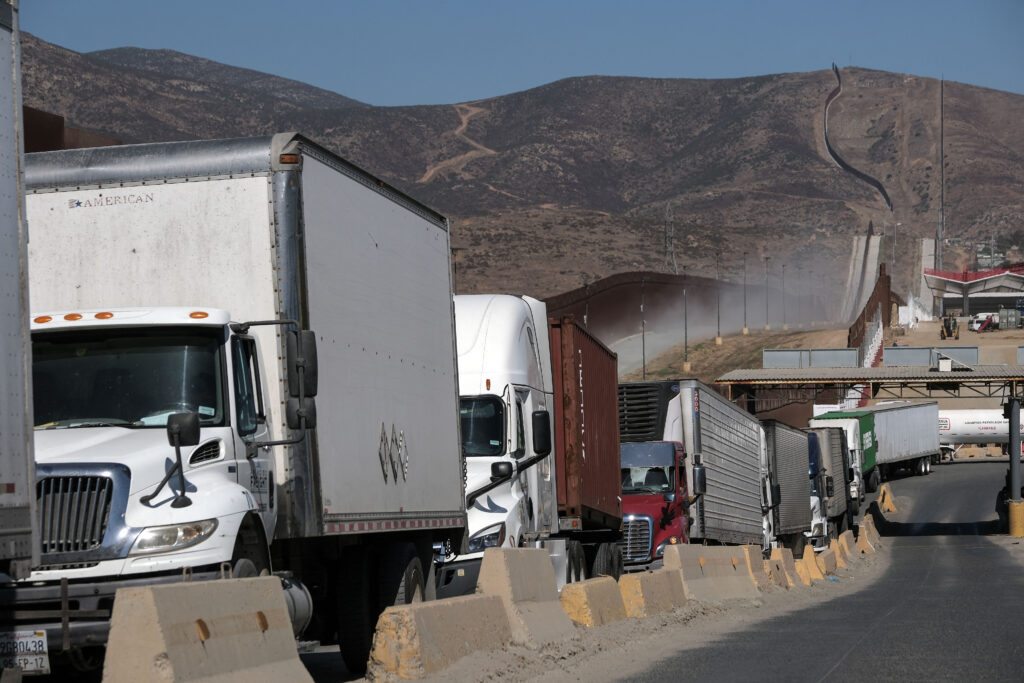Judicial reforms strain Mexican-US ties, spook investors

Trucks queue next to the US-Mexico border to cross to the United States at the Otay crossing port in Tijuana, Baja California State, Mexico, on August 22, 2024. – The United States warned Thursday that the popular election of judges proposed by the Mexican government “threatens” the trade relationship between the two countries and is a “risk” to Mexican democracy. (Photo by Guillermo Arias / AFP)
Mexico City, Mexic0 — Controversial judicial reforms promoted by Mexico’s outgoing president are straining diplomatic relations with the United States, its neighbor and key trading partner, while also rattling financial markets.
US Ambassador to Mexico Ken Salazar has warned that the changes would “threaten” a trade relationship that “relies on investors’ confidence in Mexico’s legal framework.”
The reforms, under which judges would be elected by popular vote, could pose “a major risk to the functioning of Mexico’s democracy,” he told journalists last week.
READ: US eyes possible penalties if production of China EVs moves to Mexico
In particular, they could “make it easier for cartels and other bad actors to take advantage of politically motivated and inexperienced judges,” Salazar said.
Canada, also a member of the major free trade partnership with the United States and Mexico, has for its part said investors are worried.
“My investors are concerned, they want stability, they want a judicial system that works if there are problems,” Canadian Ambassador Graeme Clark said.
Salazar’s remarks in particular irked Mexican President Andres Manuel Lopez Obrador, who announced Tuesday a “pause” in dialogue with the US diplomat, with whom he usually has close ties.
At the same time, the leftist leader clarified that he did not mean there would be a break in relations with US President Joe Biden’s government.
It came days after Lopez Obrador said his government had sent a diplomatic note to Washington to protest its “interventionist” statements on the matter.
Free trade implications
The proposed reforms have the support of Mexico’s incoming president, Claudia Sheinbaum, who will take office on October 1.
Sheinbaum, who will be the country’s first woman president, won a landslide victory in June 2 elections, but shortly afterward the Mexican stock market and currency saw a sharp decline over investor worries about the reform plans.
In her first press conference after the election, Sheinbaum pledged a “broad consultation” on the proposals, saying it would include bar associations, law schools and judges.
But with Congress due to convene on Sunday, Lopez Obrador has a one-month window to try to push through the reforms before Sheinbaum replaces him.
The bloc led by his ruling Morena party will have more than the two-thirds of votes needed in the lower chamber to amend the constitution.
In the upper house, the Senate, it will be a few seats short of that supermajority, but analysts think it can probably obtain the votes required to make up the difference.
The proposed changes “could result in a politicization of the judiciary” and “have a potentially big negative impact on Mexico’s business environment,” British consultancy firm Capital Economics wrote in a note to clients.
“The politicization of the justice system could raise concerns about whether disputes between businesses and the government would be resolved in an impartial manner,” it added.
The disagreements could complicate a review of the continent’s free trade pact, scheduled for 2026, according to experts.
Another proposed reform, seeking the dissolution of autonomous regulatory agencies, “poses a significant risk” to the agreement, political risk analysis firm EMPRA wrote in a briefing note.
The change would breach provisions in the trade deal aimed at safeguarding the autonomy of regulatory agencies to prevent state interference, it said.
The tensions come at a time when Mexico hopes to benefit from the “nearshoring” trend of companies moving manufacturing operations from Asia closer to US markets.
But in reality, Mexico’s energy policy, its “lack of will to combat organized crime” and uncertainty around its business climate have “drastically limited the country’s nearshoring potential,” EMPRA said.
The concerns have contributed to a sharp fall in the value of Mexico’s currency, which has lost about a fifth of its value against the dollar since April.
“The movement of the peso is largely due to the news about the harmful effects of the proposed reform of the judicial system,” analysts at financial firm Invex said.